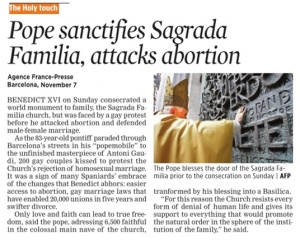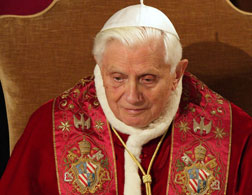Pope Benedict XVI used a famous Portugueseshrine to the Virgin Mary on Thursday as a stage to denounce abortion and gay marriage, just days before Portugal is expected to join five European countries that have legalized same-sex weddings.
Personally and professionally, I'm always up for discussing the Catholic Church's insistence on mandatory celibacy for its clergy, particularly when most people still don't know that this wasn't an original requirement and that there are exceptions made for married converts and eastern rite Catholics in places like Ukraine.
While the celibacy debate has floated around for decades -- cue that haunting "Thorn Birds" theme music -- it reliably surfaces in clergy sex abuse scandal coverage. Sexual frustration hasn't been pinpointed as the root cause of any specific cases, but logic dictates that the Catholic Church would have a much wider pool of applicants if married men were eligible for ordination (as they are in Orthodox Christian churches, though they can't go on to become bishops).
So, I found this story interesting today: about three dozen Italian women who say they are romantically involved with Roman Catholic priests have sent a letter to Pope Benedict, urging him to end mandatory celibacy.
Maybe this will prompt their "sisters" in other countries to write in, as well -- America must have at least as many clergy mistresses as Italy, if not many more. The Daily Mail reports that tens of thousands of men have left the priesthood since the 1960s, after having relationships with women. (Remember Father Alberto Cutié, the popular Florida pastor caught cavorting with his girlfriend? He's now a married Episcopal priest, and he and his wife are expecting a baby.)
Thoughts?

























